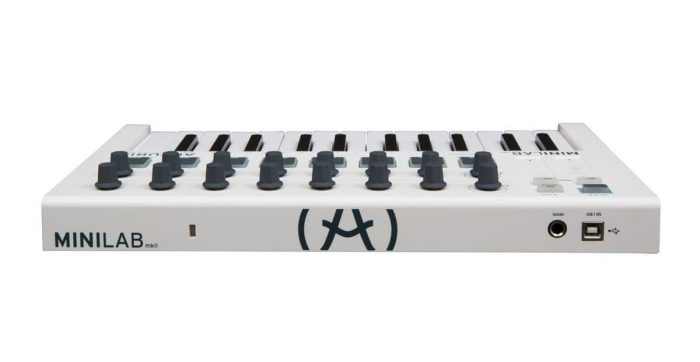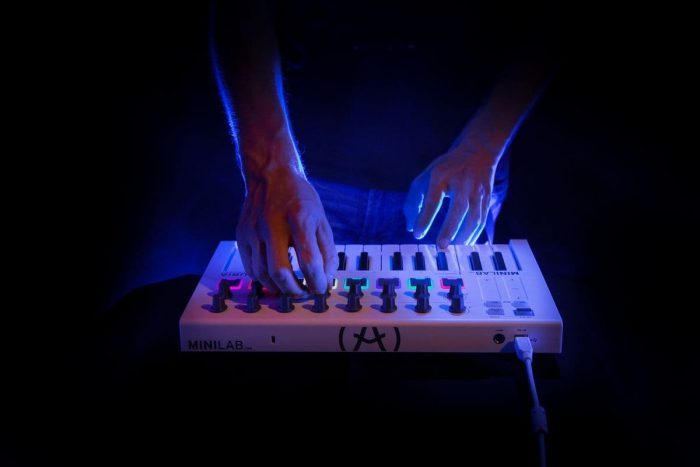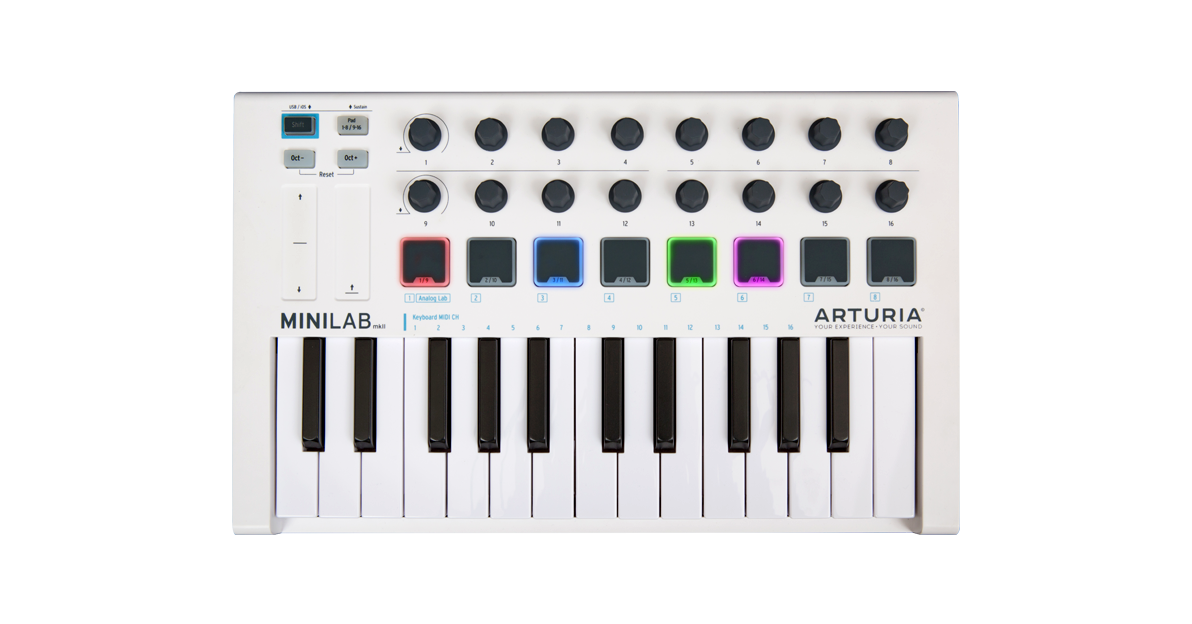Arturia MiniLab MKII – A quality MIDI controller at an affordable price (Review)
Whether you’re new to the MIDI controller world or a veteran, the MiniLab MK 2 by Arturia could certainly be a great asset to your set-up.
Firstly, I need to mention how aesthetically pleasing this MIDI controller is. As soon as you get this bit of gear out of the box it feels approachable and makes you sweat with creative juices as you reveal it from hibernation. The actual build of the MiniLab MK 2 is nice and solid; it feels almost unbreakable, which is ideal if you’re producing in various locations.
The MiniLab MK 2 comes with a few bits of  software to get you started, namely Analog Lab Lite, Ableton Live Lite and a Steinway concert grand piano provided by the UVI engine. Once you’ve installed all the necessary drivers and software, it’s time to plug in your MiniLab Mk 2. You’ll notice that the back of the device is incredibly simple, there is a footswitch Jack for sustain, a USB Type B jack and Kensington security slot. That’s it!
software to get you started, namely Analog Lab Lite, Ableton Live Lite and a Steinway concert grand piano provided by the UVI engine. Once you’ve installed all the necessary drivers and software, it’s time to plug in your MiniLab Mk 2. You’ll notice that the back of the device is incredibly simple, there is a footswitch Jack for sustain, a USB Type B jack and Kensington security slot. That’s it!
The USB Type B jack also powers this device, so there’s no need to lug around a power cable if you are making music in your portable studio.
Here are a few other technical specs:
- 25 note velocity-sensitive slim keyboard
- 2 banks of 8 velocity & pressure sensitive pads with RGB backlighting
- 16 rotary encoders (2 of them are clickable)
- Touch sensitive pitch bend
- Touch sensitive modulation wheel
- Octave up and octave down buttons
 I found this tool easy to get along with for the most part. When you open up Ableton Lite Live the MIDI is automatically assigned to the keys and editable parameters and you have a lot of wiggle room through the MIDI map within Ableton. I must say I’ve had hours of fun using this as a creative tool.
I found this tool easy to get along with for the most part. When you open up Ableton Lite Live the MIDI is automatically assigned to the keys and editable parameters and you have a lot of wiggle room through the MIDI map within Ableton. I must say I’ve had hours of fun using this as a creative tool.
The 25 note velocity-sensitive slim keyboard is nicely crafted with a well-built key bed. The keys are solid at the front of the key, a step up from the first Mini Lab by Arturia. The keys feel really sturdy and have a good velocity range. I usually don’t like slim keys but these are easy to move around, possibly because they are slightly wider than most other small controllers. There are some MIDI controllers that you wouldn’t even dream about using in a live scenario due to the lack of velocity, but with the MiniLab MK 2 you have that capability. This might be down to how the keys feel and the resistance. You have the ability to make some filthy, jarring synth noises and there is also nothing stopping you from playing some Debussy-esque romantic piano with the sustain pedal becoming a welcome addition.
Personally, I’m not overly happy with the velocity pads, they’re relatively stiff to touch and there isn’t much of a variant in sensitivity like you will find with an Akai MPC for example, however the pads themselves are an endearing feature for the price.
All pots are assignable to any editable parameter, they also have continuous rotation and pot 1 and 9 are clickable. The rotary pots are a really great tool to perfect the sound you are looking for or playing with sounds in a live scenario. I was easily able to assign the pots to various macros using Ableton which felt like a natural way of developing sounds as it gives you the freedom of using your ears and not relying on your eyes to click and drag different parameters. You can also use them as a handy navigation tool in your DAW.

I’m on the fence as to how I feel about the touch sensitive pitch bend. On one hand I like the fact that there aren’t any clunky wheels and it makes it easier to just chuck this in your bag with a laptop and set up anywhere, but I do find that using the pitch bend can be a little difficult to refine and can easily slip out of the exact pitch you want if you’re not careful. Perhaps a wheel would be better here. However I’ve found a love for the modulation strip. I’m not one for flaring my hands around like some kind of untouchable disc jockey, but that action came naturally the more I got into a composition.
The MiniLab MK 2 is impressively integrable with Ableton. I had a little bit of difficulty setting up the velocity pads with a drum rack, however after a bit of fiddling with the MIDI control centre, I was able to use the velocity pads as a drum pad in Ableton as well as a sample trigger, arming and recording tracks, they are pretty versatile.
If you’re planning on buying a MIDI controller that doesn’t break the budget, has great functionality and is easily portable you can’t go wrong with this little bit of kit for €99 ($105 / £85)
